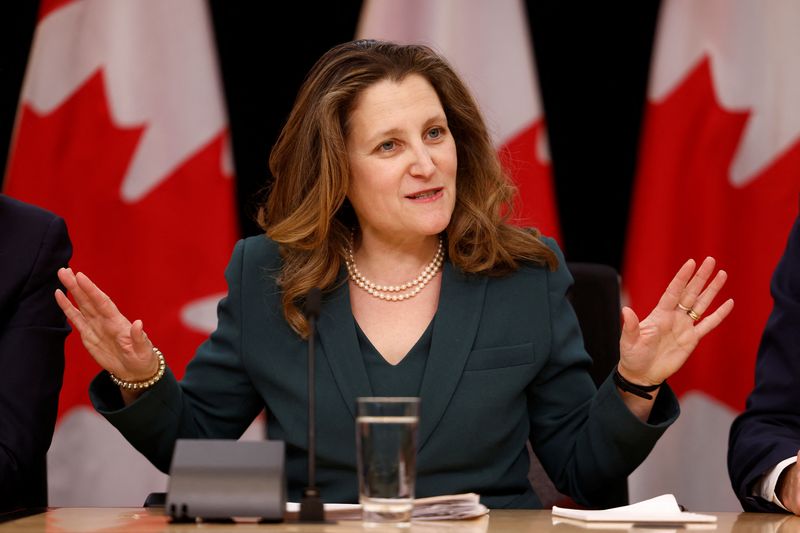
© Reuters. FILE PHOTO: Canada’s Deputy Prime Minister and Minister of Finance Chrystia Freeland takes part in a press conference in Ottawa, Ontario, Canada January 29, 2024. REUTERS/Blair Gable/File Photo
OTTAWA (Reuters) -The Canadian government will prioritize creating the economic conditions in its next budget to allow for interest rates to come down from a 22-year high of 5%, Finance Minister Chrystia Freeland said on Tuesday.
“We definitely are conscious as our priority, when it comes to economic policy, of acting in such a way that creates conditions that will make it possible for interest rates to come down,” Freeland told reporters in Ottawa.
Bank of Canada Governor Tiff Macklem, in his testimony to the House of Commons finance committee earlier this month, said major spending increases in the upcoming budget could hinder efforts to bring down inflation.
The budget is expected to be tabled in Parliament in March or April.
Prime Minister Justin Trudeau’s Liberal government has been running a fiscal deficit as debt servicing costs ballooned.
Since Trudeau launched massive public spending during the pandemic, his government has committed to bringing down the federal debt as a percentage of gross domestic product (GDP) in the medium term as a signal it is fiscally responsible.
But it twice postponed its debt-reduction goals, including in last year’s the Fall Economic Statement (FES), when it was made clear that the debt-to-GDP ratio would rise two years in a row. So the government outlined new fiscal goals.
The new fiscal anchors cap the deficit at C$40.1 billion ($29.6 billion) in the 2023-24 fiscal year – at about 1.4% of GDP. Another proposes lowering the debt-to-GDP target for the 2024-25 fiscal year relative to its November estimate and keeping the ratio declining thereafter, and finally the deficit would be kept from exceeding 1% of GDP from 2026-27.
“We intend to hit those (fiscal) targets,” Freeland said.
The Bank of Canada has kept borrowing costs at 5% in its past four meetings.
While this has helped to bring inflation down to 3.4% in December from 8.1% in June 2022, it has elevated mortgage costs, house prices and rents.
The central bank has said it is still not ready to start cutting interest rates because of stubborn, underlying inflation.
($1 = 1.3551 Canadian dollars)
Source: Investing.com


























